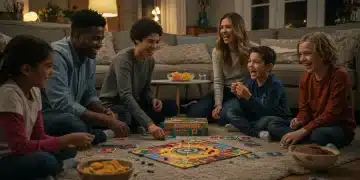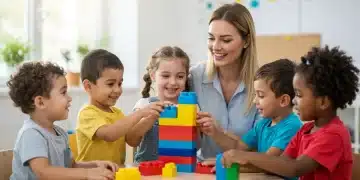Turn Chores into Games: Fun Tasks for Kids (Ages 5-12)

Turning chores into games can transform household tasks from being a dreaded obligation into a fun and engaging activity for kids aged 5-12, fostering responsibility and cooperation.
Is getting your kids to help with chores a constant battle? Discover how to turn chores into games: a guide to making household tasks fun for kids (ages 5-12), transforming mundane activities into engaging and even enjoyable experiences.
Why Turn Chores into Games for Kids Ages 5-12?
Many parents struggle to get their children involved in household tasks. Chores are often seen as boring and tedious, leading to resistance and arguments. But what if you could change that perception?
By turning chores into games, you not only make the tasks more appealing but also instill valuable life skills and a sense of responsibility. It’s a win-win for everyone involved.
Boosting Motivation Through Play
Kids are naturally drawn to games and play. Tapping into this innate desire can be a powerful way to motivate them to complete tasks they would otherwise avoid.
Creating Positive Associations
Gamifying chores helps create positive associations with these tasks. Instead of viewing chores as a burden, kids start to see them as an opportunity for fun and bonding.
- ✅ Enhanced cooperation and teamwork.
- ✅ Improved problem-solving skills.
- ✅ A stronger sense of responsibility and independence.
Transforming chores into engaging activities benefits both parents and children, making household responsibilities a more enjoyable experience for the entire family.

Creative Chore Games for Different Age Groups
The key to successful chore games is to tailor the activities to your child’s age and abilities. What works for a 5-year-old might not be suitable for a 12-year-old. Here are some ideas for different age groups:
Adjusting the complexity of the games relative to the child’s age is important in ensuring that the chores are fun and productive.
Chores for Kids Ages 5-7
For younger children, focus on simple tasks that they can easily accomplish with minimal supervision. Keep the games short and sweet to maintain their attention.
Chores for Kids Ages 8-10
Older children can handle more complex tasks and longer games. Introduce elements of competition and reward to keep them engaged.
- ⏱️ **Speed Cleaning Challenge:** Time how quickly they can clean a room or complete a task, encouraging them to beat their personal best.
- ⏱️ **Scavenger Hunt:** Hide household items and have them find and put them away.
- ⏱️ **Chore Bingo:** Create a bingo card with different chores, and reward them for completing a row or the entire card.
Turning Cleaning into a Fun Adventure
Cleaning does not have to be something your kids think of as “work.” With the right attitude and some creativity, it can be turned into family bonding time that everyone will enjoy.
Creating cleaning games for kids not only makes otherwise boring tasks more engaging with rewards, but also instills good habits that will continue long into their adult lives.
Creating a Cleaning Playlist
Music makes any activity more fun. Create a playlist of upbeat songs that will get everyone moving and grooving while they clean.
Set a Timer
Turn cleaning into a time-based challenge. Set a timer for 15-20 minutes and see how much you can accomplish as a family before the timer goes off.
- 🏠 Establish clear rules and expectations from the beginning.
- 🏠 Offer positive reinforcement and celebrate successes.
- 🏠 Be flexible and adapt the games as needed to keep them engaging.
By implementing these tips, parents can successfully transform cleaning into a fun and engaging task by ensuring they have a positive experience.

Making Laundry an Engaging Game
Laundry is often seen as a never-ending chore, but it doesn’t have to be a drag. With a little creativity, you can turn laundry day into a fun and engaging activity for the whole family.
From sorting clothes to folding towels, there are plenty of opportunities to incorporate games and challenges that will make everyone excited about laundry day.
Sorting Relay Race
Turn sorting laundry into a relay race. Divide the laundry into different piles (whites, colors, darks) and have each child race to sort their designated pile the fastest.
Folding Challenge
Challenge each child to see who can fold the most towels or shirts in a set amount of time. Award prizes for the neatest folds.
- 👕 Use visual aids like charts or diagrams to help them learn the steps.
- 👕 Break down the task into smaller, manageable steps.
- 👕 Offer plenty of praise and encouragement along the way.
Turning laundry into a game can help instill a sense of responsibility and teamwork in your children, making laundry day a more enjoyable experience for everyone.
Cooking and Meal Prep Games for Kids
Involving your children in the kitchen can be a fun and educational experience. Cooking and meal prep games can teach them valuable skills, foster creativity, and encourage healthy eating habits.
Kids gain a valuable skill in the kitchen that can eventually help them live more independently. It’s important to allow children to learn to do things for themselves.
Mystery Ingredient Challenge
Present your children with a mystery ingredient and challenge them to create a dish using it. This encourages them to think creatively and experiment with new flavors.
Recipe Scramble
Scramble the steps of a recipe and have them put them back in the correct order. This helps them develop their reading comprehension and sequencing skills.
- 🥕 Teach them about different ingredients and their nutritional value.
- 🥕 Show them how to use kitchen tools safely.
- 🥕 Encourage them to try new foods and flavors.
Introducing cooking and meal prep games helps foster a love of food and teaches your children valuable life skills that will benefit them for years to come.
The Importance of Positive Reinforcement
Recognition plays a vital role in encouraging and keeping kids motivated to do chores, especially when you are first learning to turn chores into games.
Praising them for their efforts will make a world of difference in making chores a habit and keeping an enjoyable atmosphere within the family.
Verbal Praise and Encouragement
Offer sincere praise and encouragement when your children complete chores, even if they aren’t perfect. Let them know that you appreciate their efforts.
Small Rewards and Incentives
Consider offering small rewards or incentives for completing chores, such as extra screen time, a special treat, or a small toy.
- ✨ Focus on effort and improvement rather than perfection.
- ✨ Be specific with your praise, highlighting what they did well.
- ✨ Make it fun and engaging, rather than a chore itself.
By implementing these strategies, you can make positive reinforcement an integral part of your chore routine, turning chores into a fun and rewarding experience for your children.
| Key Point | Brief Description |
|---|---|
| 🎉 Gamify Chores | Turn tasks into fun games, like races or scavenger hunts. |
| 🎨 Age-Appropriate Tasks | Adjust chores based on age; younger kids can do simpler tasks. |
| 🎶 Add Music | Play upbeat music to make cleaning sessions more enjoyable. |
| 🏆 Rewards System | Offer small rewards for completing chores consistently. |
FAQ
▼
Five-year-olds can help with tasks like putting away toys, setting the table, and helping to feed pets, promoting early responsibility.
▼
Turn chores into games, use music, create a reward system, or set time challenges to add excitement and motivation for kids.
▼
Rewards can enhance engagement, but praise and recognition are also effective in motivating kids to help with household tasks willingly.
▼
Demonstrate the chore, break it into steps, and guide your child through it initially to ensure they understand and can complete it properly.
▼
Chores teach responsibility, teamwork, and essential life skills, preparing kids for future independence and success in their adult lives.
Conclusion
Turning household tasks into enjoyable games is a fantastic strategy to engage children, fostering a sense of responsibility and teamwork. By tailoring activities to different age groups and using positive reinforcement, you can transform chores from a dreaded duty into a fun and rewarding experience for the entire family.





